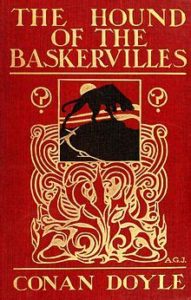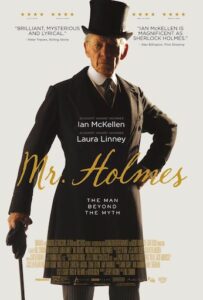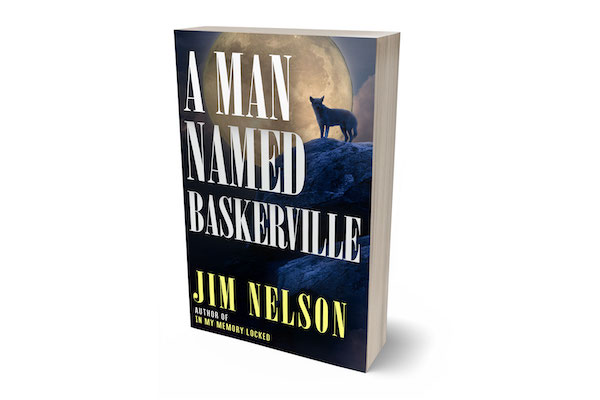[Disclaimer: I’m not a lawyer or an expert on copyright law. If you have legal questions, go talk to a pro.]
You may have heard that the United States copyright on Sherlock Holmes expired with the arrival of the New Year.
You may have also heard something similar ten or so years ago (such as this 2013 news story). Why are we going through this again in 2023?
You may also wonder how a character created in 1887—136 years ago—could have been copyrighted up until a few days back. Did all those recent Sherlock Holmes adaptations (Sherlock, Elementary, Mr. Holmes, Enola Holmes, etc.) pay a license fee to someone? Who was collecting the money?
And did I pay a license fee to publish my Sherlock Holmes book, A Man Named Baskerville?
The short summary is this:
The character of Sherlock Holmes, and most of his stories, have been in the public domain since the late 1990’s. However, Arthur Conan Doyle’s literary estate—which represents a few distant descendants—continued to insist that the character remained in copyright, and so authors and filmmakers kept paying a license fee to produce derivative works. The final batch of Holmes stories entered the public domain in 2023, but it remains to be seen if the estate will cease to claim it holds rights to depictions of him.
And, no, I did not purchase a license to publish my book last year. Here’s why.
Of the books I’ve written, A Man Named Baskerville required the most research. I studied Victorian idioms and writing patterns, the history of the Empire of Brazil, the British peerage, dog breeding and training, and the ecosystem of the Dartmoor bogs. I read and reread (and reread) the source story, The Hound of the Baskervilles. None of this was a chore.
However, I also spent a frustrating amount of time researching whether I needed to pay a license fee to publish my book. That research drew out to a confounding and depressing study in modern greed.
This is what I learned:
In the United States, the characters of Sherlock Holmes and Dr. Watson have been in the public domain for decades now. The earliest Holmes stories fell out of copyright in 1998, when U.S. legislation declared works published prior to 1923 were automatically in the public domain. That magic year—1923—was “frozen” until 2019, when the public-domain clock began moving forward. Today, the magic public domain cut-off date is 1927.
(This is an important distinction: The characters of Holmes, Watson, Moriarty, etc. were placed in the public domain in 1998, even though some of the later stories remained under copyright. As you’ll see, the Doyle literary estate played up this confusion for their own ends.)
The first Sherlock Holmes stories were published in 1887. The bulk of them were published prior to 1923. You’d think authors and filmmakers have been free for decades now to produce new Sherlock Holmes works. You would be wrong, in a way.
The complication stems from Doyle’s writing history. Although he killed off Holmes in 1893’s “The Final Problem,” he returned to the character in The Hound of the Baskervilles (serialized in 1901–1902) and brought the detective back to life in 1903’s “The Adventure of the Empty House.” Doyle continued producing Holmes stories and novels until 1927—meaning he produced four years’ worth of work that remained copyrighted though the end of 2022.

Astoundingly, the Doyle literary estate did not stop insisting after 1998 that depictions of Sherlock Holmes required a license. Their logic was that since some of the Sherlock Holmes stories remained copyrighted, the estate still held rights to the character. What’s more, they asserted any depiction of a “rounded” Sherlock Holmes—that is, a Sherlock Holmes with feelings—was also copyrighted. (It’s preposterous, and I won’t go into their reasoning here.)
These specious claims crashed into a wall of common sense thanks to author Leslie S. Klinger suing the estate in 2013. Klinger had previously paid a $5,000 licensing fee to publish his first Sherlock Holmes book. He refused to pay for his second book; the Doyle estate threatened to prevent the book’s distribution. Judge Richard Posner recounted the estate’s threats in his findings:
[The estate] did not mince words … “If you proceed … to bring out [the sequel] unlicensed, do not expect to see it offered for sale by Amazon, Barnes & Noble, and similar retailers. We work with those compan[ies] routinely to weed out unlicensed uses of Sherlock Holmes from their offerings, and will not hesitate to do so with your book as well.”
Posner excoriated Doyle’s estate, calling their actions “a form of extortion”:
The Doyle estate’s business strategy is plain: charge a modest license fee for which there is no legal basis, in the hope that the “rational” writer or publisher asked for the fee will pay it rather than incur a greater cost, in legal expenses, in challenging the legality of the demand.
Posner also tossed out the estate’s attempt to extend their copyright via the last remaining stories, as well as their “Sherlock Holmes with feeling” claim. He said their appeal “bordered on the quixotic.”
This is why, when the suit was settled, news sources in 2013—ten years ago—were printing headlines like “Finally, Sherlock Holmes Is Now in the Public Domain.” Considering Posner’s scathing dressing-down of the estate, you’d think the matter was settled. Again, you would be wrong.
Unabated and shameless, the Doyle literary estate continued to squeeze payments from authors and filmmakers. One victim of this bogus “Sherlock Holmes with feeling” copyright was the 2015 film Mr. Holmes, starring Ian McKellan. Another was the Netflix production of Enola Holmes. The final 2020 settlement details are undisclosed, but I wager Netflix paid the Doyle estate rather than continue with a protracted lawsuit—exactly the shakedown Posner described in his Klinger decision.
With the passing of 2022, articles blossom again with proclamations that the master detective is finally in the public domain—“Now anybody can write a Sherlock Holmes story.” Actually, anybody could have written a Holmes story since 1998—it’s only due to an insufferable and insatiable literary estate that anyone would think otherwise.

With the entire Sherlock Holmes corpus now in the public domain, this must close the door on the estate’s claims, right? I’m dubious. The Doyle estate has been told at least twice in the past (in 1998, again in 2013) they do not hold a copyright on the detective. That did not stop them from abusing their namesake’s prestige to squeeze money out of creators.
If you think I’m being cynical, consider that the estate continues, in 2023, to solicit license fees from prospective Holmes authors. A separate agency solicits licenses for Sherlock Holmes memorabilia and merchandise—even though generic depictions of the detective are entirely in the public domain and do not require a license. The literary estate’s web site is polished and professionally-produced. You could not blame a naive author wandering onto it and concluding they must pay a license fee to publish a Sherlock Holmes book.
And if you think I was being paranoid or overly self-important worrying that the Doyle estate would come after me, recall that they were more than happy to take Leslie Klinger—an independent author you may not have heard of before—all the way to the 7th Circuit court of appeals. Remember what they told him: “Do not expect to see [your book] offered for sale by Amazon, Barnes & Noble, and similar retailers. We work with those companies routinely to weed out unlicensed uses of Sherlock Holmes.” Would Amazon’s algorithm automatically ban or blacklist my book because it did not carry a license from the Doyle estate?
And if that sounds farfetched, know that several years ago Amazon informed me that they would de-list my first novel because its description contained the phrase “Star Wars.” They didn’t care that my novel centers on the development of the Strategic Defense Initiative (SDI), dubbed “Star Wars” by its critics. I removed the phrase from my description, and the book continues to be sold online. I’m not happy about that, though.
With all that in mind, I decided to risk it. The strength of the Klinger decision convinced me the Doyle estate did not hold the copyright to Sherlock Holmes, that I didn’t need to obtain a license, that I didn’t need to wait until 2023 to publish A Man Named Baskerville—that I was entirely free to take the original Baskerville story and re-shape and re-imagine it from the perspective of the villain himself. That’s exactly what I did.

